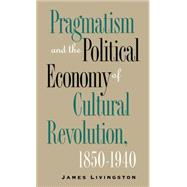
Note: Supplemental materials are not guaranteed with Rental or Used book purchases.
Purchase Benefits
Looking to rent a book? Rent Pragmatism and the Political Economy of Cultural Revolution, 1850-1940 [ISBN: 9780807846643] for the semester, quarter, and short term or search our site for other textbooks by Livingston, James; Trachentenberg, Alan. Renting a textbook can save you up to 90% from the cost of buying.
| Foreword | p. xi |
| Preface | p. xxiii |
| Acknowledgments | p. xxix |
| The Political Economy of Consumer Culture, 1850-1940 | p. 1 |
| Making Use of Marx | p. 3 |
| Consumer Goods and Continental Industrialization, 1850-1900 | p. 24 |
| Corporate Capitalism and Consumer Culture, 1890-1940 | p. 84 |
| Naturalism, Pragmatism, and the Reconstruction of Subjectivity, 1890-1930 | p. 119 |
| The Subject of Naturalism | p. 132 |
| p. 158 | |
| Money Questions and Moral Equivalents in the Future Tense | p. 181 |
| The Romantic Acquiescence: Pragmatism and the Young Intellectuals | p. 225 |
| p. 257 | |
| Notes | p. 295 |
| Index | p. 389 |
| Table of Contents provided by Publisher. All Rights Reserved. |
The New copy of this book will include any supplemental materials advertised. Please check the title of the book to determine if it should include any access cards, study guides, lab manuals, CDs, etc.
The Used, Rental and eBook copies of this book are not guaranteed to include any supplemental materials. Typically, only the book itself is included. This is true even if the title states it includes any access cards, study guides, lab manuals, CDs, etc.